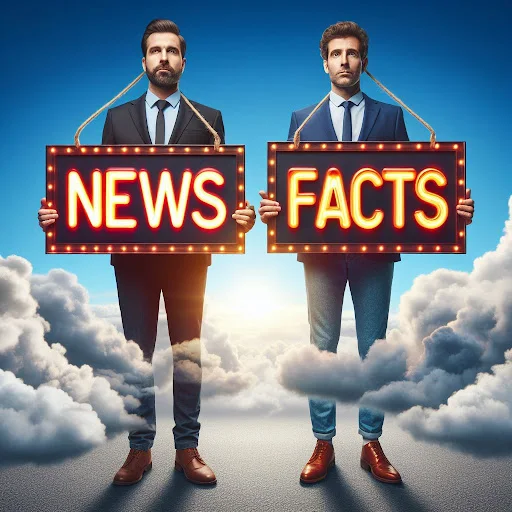Some research suggests that news coverage can, even unknowingly, spread misinformation. RAND researchers wanted to test this by investigating how Americans distinguish factual statements from ones which can only be proved or disproven with objective evidence.
Our results reveal that distinguishing facts from opinions is difficult for Americans, although those possessing certain characteristics tend to do it better than others.
Fact Checking
Fact checking is a practice used to identify errors in news reports and provide readers with more accurate information. It also plays an essential role in mitigating misinformation's influence over people's opinions and decisions. Some fact checkers focus on specific topics while others investigate claims made by public figures like politicians or influential actors.
No matter what content they're reviewing, most fact checkers tend to follow certain practices in their work. They verify each claim by considering its context and analyzing reporter sources in order to assess credibility; additionally they search for additional corroborating sources that might help confirm or refute claims; document all findings for future reference and ensure their work can be easily revisited when necessary.
Fact-checking organizations also often target specific audiences, often policymakers or influential actors who might be spreading misinformation. They use various tactics to counter these actors, including demanding formal corrections from them and filing complaints against them; however, research on the efficacy of such strategies remains limited. Some scholars maintain that fact checking alone cannot change deeply-held beliefs, especially if these are founded upon false information. Critics contend that fact-checking may contribute to the spread of dangerous information, as witnessed during the COVID-19 pandemic when watching Fox News was linked with believing in conspiracy theories and not adhering to health experts' advice for social distancing.
Factors Influencing Factual Accuracy
Over time, the line between objective facts that can be verified and the opinions crafted by journalists has become increasingly blurry. Today there are virtually limitless sources online publishing content; editorial, op-ed or commentary no longer serve to distinguish their writing from more objective reporting - leading to inaccurate news stories as well as confusion surrounding journalism's purpose and role.
Most Americans agree that news is essential and can enrich their quality of life, yet many remain unclear whether the facts presented in news stories are reliable or not. A 2018 RAND study, Truth Decay, revealed four trends - increasing disagreement about objective facts; blurring lines between fact and opinion; digital platforms as sources for news; and declining trust in government, media, and other institutions that used to present accurate news - that have degraded factual discourse and diminished people's ability to comprehend important public issues.
Examining the factors that contribute to factual accuracy can provide us with insight into why people's views of news quality have changed and what can be done to restore public faith in its value. One potential solution might be increasing fact checks in news stories; according to one experiment that tested this, fact checking increased EPE (epistemological political efficacy) when interest in a story was moderate to high and future news use intent increased while when interest dropped below 20% it decreased EPE and future news use intent decreased significantly.
Factors Influencing Opinions
As well as fact checking, other factors influence opinion formation and expression. For instance, people who are politically aware or digitally adept tend to possess better political knowledge. Furthermore, they may get their news from multiple sources which allows them to better detect misinformation or falsehoods in the media - an experiment conducted on COVID-19 misinformation found that frequent news use did not lead to false belief formation but instead increased people's abilities to detect false statements even when attributed to their favorite news source.
Research by the RAND team into media presentation over time and across platforms reveals that news reporting has changed, shifting away from Walter Cronkite-style serious coverage towards more subjective, abstract, directive, and argumentative language. This change has coincided with an increase in airtime dedicated to advocacy rather than objective descriptions of context or events.
As allegations of bias erode trust in journalism's impartiality, this study assessed whether providing defense of journalism stories would combat these effects. To do so, an online news portal was modified with fact checks and opinion pieces supporting journalism stories as a variable; throughout a series of experiments the researchers observed that while fact checking increased media trust and epistemic political efficacy significantly more when combined with defense stories than without them.
Factors Influencing Public Trust
Today's media landscape requires us all to quickly make judgments about whether they can trust news. This research examined one basic step of that process: distinguishing factual from opinion statements by using objective evidence as criteria.
To investigate, we presented respondents with five factual statements, five opinions and two "borderline" statements which did not fall neatly into either bucket - these "borderline" statements. They were then asked whether each statement they heard fit the description of being either factual or subjective.
Results revealed that most people, even those who trust news media heavily, were poor at distinguishing facts and opinions. Only 35% correctly identified all five factual statements; less than 10% correctly identified all of their opinion statements - suggesting misinterpretation could have serious ramifications on information environments.
Study results also revealed that individual differences in people's abilities to distinguish fact from opinion are determined by multiple other factors. For instance, those listening to talk radio programs featuring anti-media rhetoric are more likely than others to perceive news media stories as biased; such exposure has also been associated with lower overall and platform trust levels in some countries.












No comments:
Post a Comment